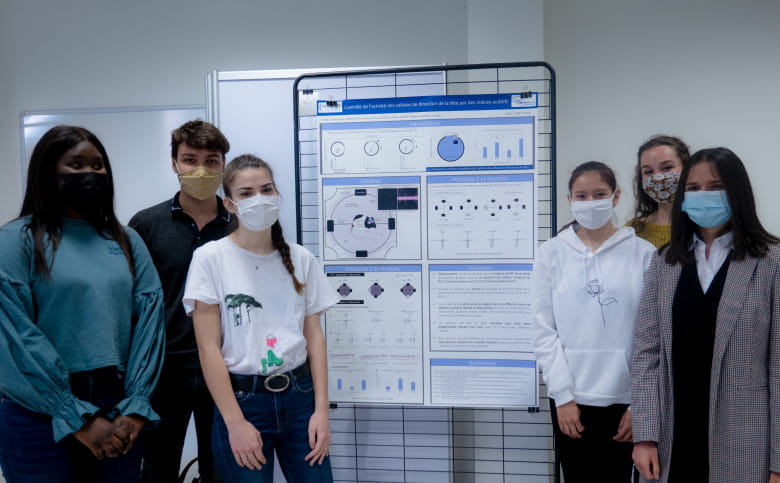
Tutored practice for 3rd-year Neuroscience track
NeuroSchool invites you to take a look at its life sciences bachelor students who have chosen the "neuroscience" course. During their last semester, they have the opportunity to project themselves in a real research work.
Like Doriane and Ludovic, NeuroSchool students in the 3rd year of the bachelor’s degree in life science, neuroscience track, had the opportunity, throughout the last semester, to put themselves in the shoes of researchers! It is as part of a UE (Unité d’Enseignement) called Recherche Tuteurée et Épreuve Intégrative (RTEI), that bachelor’s students, accompanied by their tutors, enter the life of a researcher in a neuroscience laboratory.
We met these students during the restitution of their laboratory experience in the form of a scientific poster : discover their personal accounts!
EU Tutored research and integrative testing
The life science bachelor, neuroscience track, which is part of the NeuroSchool, offers students a unique opportunity to discover the research environment inside laboratories from the third year of higher education!
This UE recherche tuteurée et épreuve intégrative (RTEI) allows students to set up a tutored research project in connection with the laboratory of the tutor. During this work, the students of licence 3 are familiarized with the various stages of a research work: identification of the scientific question, bibliographical research, development of the protocol, then collection and treatment of the data for a research project and finally presentation of the work carried out.
In practice, students work in groups of 5 under the supervision of a teaching assistant “tutor”. Half a day per week (for 12 weeks) is dedicated to work on this UE. The tutors guide the students on a regular basis throughout the semester, at each stage of the project. They also welcome them in their laboratory to let them carry out the experimental or development part of the project. The project is then finalised during a scientific poster presentation by the student groups. Presenting one’s research work in the form of a scientific poster is a recurrent exercise in the research world. It is therefore a great exercise for these aspiring researchers!
What are the skills developed in this course?
- To develop and use an experimental approach (biological or numerical) to solve a problem specific to the Neurosciences.
- To search and collect information related to a scientific theme by showing a critical mind
- To know how to organise and implement a project in a team but also one’s own work
- To interpret the observations and results of experiments by mobilising the knowledge and theories from the neuroscience courses
- To propose a simple experimental protocol to test and validate a hypothesis
- To write a scientific report
- To give an oral presentation of a scientific work
Of course, the licence 3 neuroscience course is more than this UE! This track provides solid theoretical and practical knowledge in neuroscience. It is organised around complementary disciplinary teaching from cellular and molecular biology, physiology and behavioural sciences. Secondly, as the RTEI course shows, this track places great emphasis on statistical tools, modelling and practical teaching, to quickly give the student an introduction to the experimental process, good laboratory practice and data analysis.
The students give their feedbacks !
We met the 2020-2021 class of NeuroSchool students in their 3rd year of a neuroscience track who were presenting their scientific poster in front of their teacher-researchers.
Doriane and Ludovic tell us about the results of a whole semester of work!
I found this RTEI UE a really great experience! It cut us off from our telework context, covid-19 forced, by going to the laboratory. It allowed us to manipulate, but also to meet in person and in their environment our teachers, which we did not have the opportunity to do until then.
This course also allowed us to discover what research is all about, i.e. to make mistakes in manipulations, etc. And yes, being wrong... it is sometimes important! Not having conclusive results allows us to ask for help, to rework our results, to understand what went wrong. In the end, we made the posters that we are presenting today!
We worked in groups on the literature review beforehand: we had to find out what already existed on the subject and this was a major task. Then we built and designed the poster together. This summary exercise was also a lot of work! We started with a lot of pages, which had to be reduced to a poster composed of a few figures and paragraphs: quite an exercise!
First of all, this course has helped me a lot in my orientation process. Indeed, I would like to become a researcher and this course offers a good first experience to anyone who has not already doing an internship. My group and I were present at the manipulations carried out by our tutor, but we were not able to do any. Indeed, we had to work on rats, and when you work on an animal model, you have to be particularly careful and avoid manipulations as much as possible.
The summary exercise for the scientific poster was very interesting. We were well guided by our tutor. My group was also very nice, that helps! The presentation of the poster is done in oral form. Relying on this poster format, where all the information is condensed, is a big change from traditional PowerPoint presentations!
It is in fact the entire RTEI EU that changes our habits. Indeed, since the first year of the degree, we have been doing exclusively lessons, tutorials and sometimes practical work. We do very few orals, we don't discover laboratories... In the end, we don't get to know what research is all about. This UE offers us a good insight into this professional world. In my opinion, it should be given in every year of the bachelor.












